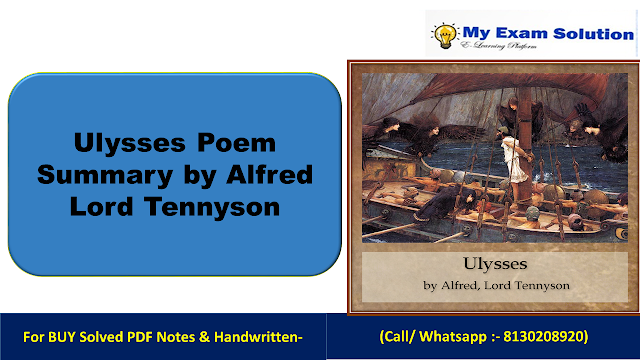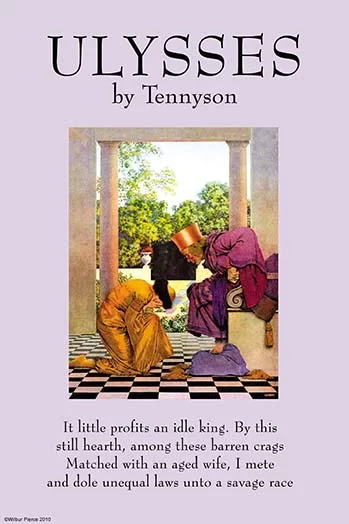Ulysses Poem Summary by Alfred Lord Tennyson
Alfred Lord Tennyson's
"Ulysses" is a celebrated and timeless poem that explores the
enduring themes of adventure, the indomitable human spirit, and the unyielding
desire for new experiences, even in the face of old age. This dramatic
monologue, composed in 1833, presents the voice of the aging Ulysses, the
legendary hero of Homer's epic poems, the "Iliad" and the "Odyssey."
In this poem, Ulysses reflects on his life's journey, yearning for further
exploits, and affirming his unwavering commitment to a life lived to the
fullest.
Ulysses Poem Summary by Alfred Lord Tennyson-In addition to capturing Tennyson's
literary genius, "Ulysses" provides insightful analysis of the human
condition. Tennyson captures the core of the human spirit's yearning for
adventure, its refusal to be limited by age or situation, and its enduring
drive to embrace life's difficulties and opportunities through the poem's
vibrant language and rich imagery.
Ulysses Poem
It little profits that an idle king,
By this still hearth, among these barren crags,
Match'd with an aged wife, I mete and dole
Unequal laws unto a savage race,
That hoard, and sleep, and feed, and know not me.
I cannot rest from travel: I will drink
Life to the lees: All times I have enjoy'd
Greatly, have suffer'd greatly, both with those
That loved me, and alone, on shore, and when
Thro' scudding drifts the rainy Hyades
Vext the dim sea: I am become a name;
For always roaming with a hungry heart
Much have I seen and known; cities of men
And manners, climates, councils, governments,
Myself not least, but honour'd of them all;
And drunk delight of battle with my peers,
Far on the ringing plains of windy Troy.
I am a part of all that I have met;
Yet all experience is an arch wherethro'
Gleams that untravell'd world whose margin fades
For ever and forever when I move.
How dull it is to pause, to make an end,
To rust unburnish'd, not to shine in use!
As tho' to breathe were life! Life piled on life
Were all too little, and of one to me
Little remains: but every hour is saved
From that eternal silence, something more,
A bringer of new things; and vile it were
For some three suns to store and hoard myself,
And this gray spirit yearning in desire
To follow knowledge like a sinking star,
Beyond the utmost bound of human thought.
This is my son, mine own Telemachus,
To whom I leave the sceptre and the isle,—
Well-loved of me, discerning to fulfil
This labour, by slow prudence to make mild
A rugged people, and thro' soft degrees
Subdue them to the useful and the good.
Most blameless is he, centred in the sphere
Of common duties, decent not to fail
In offices of tenderness, and pay
Meet adoration to my household gods,
When I am gone. He works his work, I mine.
There lies the port; the vessel puffs her sail:
There gloom the dark, broad seas. My mariners,
Souls that have toil'd, and wrought, and thought with me—
That ever with a frolic welcome took
The thunder and the sunshine, and opposed
Free hearts, free foreheads—you and I are old;
Old age hath yet his honour and his toil;
Death closes all: but something ere the end,
Some work of noble note, may yet be done,
Not unbecoming men that strove with Gods.
The lights begin to twinkle from the rocks:
The long day wanes: the slow moon climbs: the deep
Moans round with many voices. Come, my friends,
'T is not too late to seek a newer world.
Push off, and sitting well in order smite
The sounding furrows; for my purpose holds
To sail beyond the sunset, and the baths
Of all the western stars, until I die.
It may be that the gulfs will wash us down:
It may be we shall touch the Happy Isles,
And see the great Achilles, whom we knew.
Tho' much is taken, much abides; and tho'
We are not now that strength which in old days
Moved earth and heaven, that which we are, we are;
One equal temper of heroic hearts,
Made weak by time and fate, but strong in will
To strive, to seek, to find, and not to yield.
Summary of "Ulysses" by Alfred Lord Tennyson:
The poem is a dramatic monologue,
with Ulysses addressing his mariners, who have sailed with him on his
adventures and challenges. He speaks as a seasoned and aging king who has
returned to his kingdom of Ithaca after his long and arduous voyages, including
the famous one recounted in Homer's "Odyssey."
In the opening lines, Ulysses expresses his discontent with the idle and mundane life he leads in Ithaca. He feels that it is not fitting for a hero like himself to settle into a quiet and uneventful existence. He yearns for the excitement and challenge of the open sea and the unknown adventures that lie beyond.
Ulysses thinks back on his previous
adventures and the friendship he had with his seafaring companions. Although he
accepts that they are all getting older, he does not see this as a drawback.
Rather, he thinks that their past has strengthened and resolved them. According
to Ulysses, his seafarers are a collection of unbreakable spirits that are not
intended for a comfortable and idle existence.
The poem conveys Ulysses'
unwavering spirit and his unquenchable thirst for new experiences. He describes
how he will set out on another voyage, even in his old age. He emphasizes the
importance of striving, seeking, and finding, and never yielding to the
constraints of time and age.
Also Read-
The Guide By R.K. Narayan Plot Summary, Character, Introduction
Ulysses then turns his attention to
his subjects in Ithaca, particularly his son Telemachus and his wife Penelope.
He acknowledges the responsibilities of ruling a kingdom but suggests that his
son and his trusted advisors can handle the affairs of Ithaca in his absence.
He is determined to explore new horizons, no matter the cost.
Ulysses Poem Summary by Alfred Lord Tennyson-In the final lines of the poem,
Ulysses reaffirms his commitment to adventure and the pursuit of the unknown.
He believes that it is better to strive and face challenges, even if it leads
to failure, than to stagnate in the safety of his kingdom. He ends with the
famous line, "to strive, to seek, to find, and not to yield," which
encapsulates his unyielding spirit and his determination to live life to the
fullest.
Key Themes in "Ulysses":
The Spirit of Adventure:
"Ulysses" is a poem that celebrates the spirit of adventure and the
desire for new experiences. Ulysses embodies the restless and adventurous
nature of the human spirit. He longs for the challenges and excitement of the
open sea, even in his old age.
The Heroic Ideal: Ulysses is
portrayed as a heroic figure who has faced numerous challenges and triumphed
over adversity. The poem reflects the Romantic ideal of the heroic individual
who seeks to push the boundaries of human experience.
Aging and Mortality: Ulysses'
acknowledgment of his own mortality and aging is a central theme. He refuses to
succumb to the limitations of old age and instead chooses to live life to the
fullest in his remaining years.
Legacy and Leadership: Ulysses
grapples with the responsibilities of leadership and the desire to leave a
lasting legacy. He contemplates the role of his son and his kingdom in his
absence.
Determination and Perseverance: The
poem underscores the importance of determination and perseverance in the face
of adversity. Ulysses is determined to continue his quest for adventure,
regardless of the obstacles in his path.
Literary Devices in "Ulysses":
Dramatic Monologue: The poem is
presented as a dramatic monologue, where Ulysses speaks directly to his
mariners and the reader. This form allows the reader to gain insight into
Ulysses' thoughts and feelings.
Metaphor: The poem employs
metaphors to convey its themes. For example, the sea is a metaphor for the
unknown and the unexplored, while the mariners represent the adventurous spirit.
Allusion: The poem alludes to
Homer's epic poems, the "Iliad" and the "Odyssey," where
Ulysses (Odysseus) is the central character. Tennyson's poem builds on the
character and adventures of Ulysses from these classical texts.
Enjambment: The poem uses enjambment,
where lines flow into each other without punctuation, to create a sense of
continuity and fluidity in the narrative.
Imagery: Tennyson employs vivid
imagery to describe Ulysses' yearning for adventure and the challenges of the
sea. The sea is depicted as a place of excitement and mystery.
Repetition: The repetition of the
phrase "To strive, to seek, to find, and not to yield" emphasizes
Ulysses' determination and his unwavering commitment to his ideals.
The Message of "Ulysses":
"Ulysses" conveys a
powerful message about the human spirit's relentless pursuit of adventure and
the refusal to be confined by age or circumstance. Ulysses embodies the heroic
ideal of a life lived to the fullest, characterized by determination, perseverance,
and the willingness to face challenges head-on. The poem suggests that the
desire for new experiences and the spirit of adventure are fundamental to the
human condition. Ulysses' call to "strive, seek, find, and not yield"
resonates with readers as a reminder to embrace life's challenges and
possibilities, regardless of one's age or station in life.
Generations of readers have found inspiration
in this poem, which continues to be a timeless examination of the human urge
for adventure and the resistance to let age and time limit one's possibilities.
The advice given by Ulysses still acts as a call to action for people who want
to experience life to the fullest and go out on their own valiant adventures.
Conclusion
In Alfred Lord Tennyson's poem
"Ulysses," the poet explores the themes of adventure, the human
spirit, and the desire for new experiences in the face of old age. Through the
voice of the aging Ulysses, who longs for one last journey and reflects on his
life's adventures, Tennyson delivers a powerful message about the indomitable
nature of the human spirit.
The poem celebrates the heroic
ideal, portraying Ulysses as a figure who has triumphed over adversity and
continues to seek challenges and excitement, even in his advanced years. It
delves into the themes of aging and mortality, with Ulysses refusing to accept
the limitations of old age and instead choosing to embrace life to the fullest.
"Dramatic monologue"
serves as the literary device through which Ulysses directly addresses his
mariners and the reader, allowing us to gain insight into his thoughts and
emotions. Metaphors, allusions to classical literature, enjambment, imagery,
repetition, and other literary techniques enhance the poem's depth and impact.
The everlasting theme of
"Ulysses" is the human spirit's unwavering quest of adventure and its
refusal to let age or circumstance limit it. Regardless of age or status,
Ulysses' exhortation to "strive, seek, find, and not yield" is a
potent reminder to seize life's opportunities and challenges. Generations of
readers have been moved by the poem, which is still relevant today as a
celebration of the universal human need for adventure and the will to defy
aging and time.
"Ulysses" is a testament
to Tennyson's poetic prowess and his ability to capture the essence of the
human condition in a form that endures and inspires. It remains a classic in
the realm of English poetry, cherished for its evocative language, profound
themes, and the timeless message it imparts to all who read it.








0 comments:
Note: Only a member of this blog may post a comment.